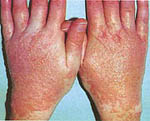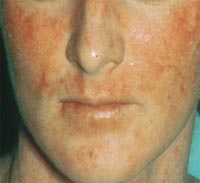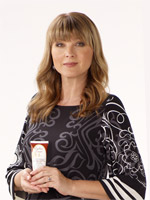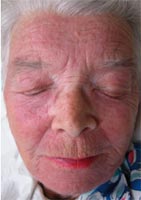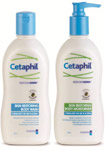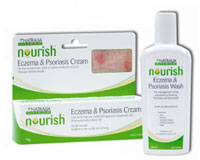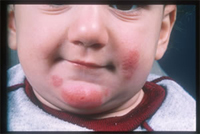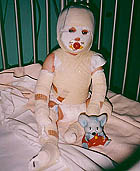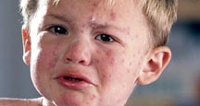Eczema Awareness Week FAQs
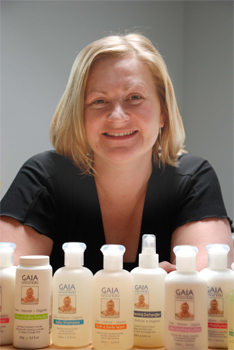
Eczema Awareness Week FAQs
Michelle Vogrinec, Aussie mum of three, Creator and MD of GAIA Skin Naturals is often asked about eczema given her personal story of trying to find suitable skincare for her firstborn son's sensitive skin when he developed eczema at just 8 weeks of age - which eventually led her to create her own natural & organic baby skincare range GAIA Natural Baby, now 12 years ago. Since then she has launched -eczema friendly' skincare ranges for pregnancy, men and women. Please find her answers below to some of her most frequently asked questions…
What are the triggers for eczema?
'The exact cause of eczema is unknown. It can be caused by so many different things. There however a few common allergens that can trigger a 'flare up". Even though everyone's triggers are different, it is recommended to avoid contact with soap, artificial fragrance, high foaming agents and some preservatives in skin care products. In foods, avoiding flavour enhancers and unnecessary additives and preservatives, and environmental things like dust mites, pollens, flowers and tobacco smoke, may assist in minimising exposure to triggers and flare ups."
said Michelle.
Is it controllable? How?
'Yes, you can manage your eczema.
Firstly, try to discover your particular triggers and avoid these things if/when possible and/or make alternative choices. For example – if wheat is one of your triggers, try gluten-free breads and pastas or go with rice instead. Or if soap is your trigger swap over to buying soap-free toiletries and household products. These sorts of things are now more readily available in your supermarket so it is easier to make changes and try things which may be more suitable for you.
Additionally, because eczema skin is dry skin, it has lost some of its barrier function. It is therefore unable to retain moisture and block irritants and allergens such as dust, grass and wool fibres on its own resulting in the -eczema patches' which can be red, crusty, scaly, flaky, weepy and itchy. Moisturisers can help to maintain the skin barrier and, if used regularly - particularly at the first sign of dry skin – may help the appearance and comfort of skin affected by eczema.
According to the Eczema Association of Australasia (EAA), for mild eczema, and many cases of moderate eczema, adequate moisturisers combined with a good, general skin care routine can be used to successfully manage the condition. Even when a prescription medicine may be required to treat the affected area, moisturisers are often recommended to be used regularly and as early as possible, to obtain maximum benefit.
'Of course, it is always recommended to seek medical advice from your doctor or health professional for your particular condition." said Michelle.
Does eczema get better as your child grows?
'Although eczema can affect all ages, it usually appears in early childhood (in babies between two-to-six months of age) and disappears around six years of age. In fact, according to the Eczema Association of Australasia, more than half of all eczema sufferers show signs within their first 12 months of life and 20 per cent of people develop eczema before the age of five.
The good news is most children grow out of the condition, but some may experience eczema into adulthood." said Michelle.
How should I bathe a child with eczema?
'Keep the bath water to body temperature or below, which is about 34-36 degrees. Most people have their baths way too not without even realising it. Try using a bath thermometer as a guide in order for the heat not to further irritate or dry out the skin. Gently apply a cleansing product that is pH balanced, does not contain any trigger ingredients such as soap, sulphates, artificial perfumes or harsh chemicals and preferably contains moisturising ingredients. Do not rub the skin vigorously and, if using a washer, ensure it is soft and thoroughly wet. Gently pat the skin dry with a soft towel – again do not rub as this may further irritate the skin.
Apply a moisturiser within three minutes of bathing (while the skin is still slightly damp) to -lock in' the moisture. For extra moisturisation at bath time, I suggest using a plant-based baby oil in the bath water. Adding a couple of drops of the oil with your wash will provide an even more nourishing and moisturising bath. It will leave skin feeling gorgeous! It is especially handy if you won't have time to apply moisturiser after the bath. (GAIA Natural Baby Massage Oil is mineral oil free so it will absorb beautifully into your baby's skin and won't clog pores or cause irritation – with NO greasy residue)." said Michelle.
What part do cleansers play in the treatment of infant eczema?
'Adequate skin cleansing is vital for general healthand healthy skin. Washing with water alone is not enough to clean baby's skin from the build-up of dirt, urine, faeces and bacteria which can lead toirritation and infections -especially in the skin folds and nappyarea.
But choosing a suitable cleanser to use on babies and one that won't further dry or irritate the skin – particularly if bub has eczema - is extremely important.
Baby skin is already thinner than an adult's, and has not yet fully developed its acid mantle and normal barrier functions, making it more sensitive.
Additionally, with eczema, the skin has lost some of its natural defenses, due to the defective barrier functions. This makes baby's skin less able to withstand environmental challenges. Further to this,soap, harsh detergents and some cleansers can strip baby's natural protective skin oils, temporarily raise pH levels, and be quite irritating and drying on sensitive baby skin.Therefore, it is recommended notto use soap or solid cleansing bars, artificial fragrances or cleansers with harsh detergents when washing baby's skin, but to choose a pH balanced, soap and sulphate free product, preferably with added moisturising ingredients.
If possible, test the product on a small area of skin first for a few days/weeks to ensure that it does not sting, burn or irritate the skin. (Some companies can provide you with free single use samples for this purpose). If the product causes an immediate reaction – discontinue use immediately and seek medical advice." said Michelle.
What part do moisturisers play in the treatment of my infant eczema?
'Moisturisers can play a pivotal role in any management/treatment plan for all dry skin conditions, particularly eczema.
In fact, according to some leading dermatologists, good eczema management is impossible without regular use of a moisturiser.
Many people tend to under-use moisturiser because constantly applying it can often prove time-consuming, tedious and inconvenient but when used correctly, as part of a daily skin care treatment regime, and earlier rather than later in the eczema cycle, moisturisers can be highly effective.
There are a number of key features to look out for when choosing a moisturiser. Firstly to look at (or ask for) the ingredients listing for any obvious known triggers and educate yourself on what some of the big names used actually mean so you can make an informed choice.
I also suggest choosing products that are free from artificial fragrance and other harsh chemical s which are possible irritants such as petrochemicals, mineral oil and paraben preservatives.
Again, if possible, test the moisturiser on a small area of skin first for a few days/weeks to ensure that it does not sting, burn or irritate the skin. If it does – discontinue use immediately and seek medical advice." said Michelle.
How often should you moisturise your baby with eczema?
'A moisturiser should used liberally and frequently several times a day – even every hour or two if the skin is very dry, or at least morning and night.
Apply the moisturiser gently, without rubbing, ideally after bathing or showering while their skin is still damp (within three minutes) and while the water remains trapped in your skin to help lock in moisture.
Continue to use the moisturiser daily, even when your eczema patches have improved or cleared. This may help to prevent frequent and severe flare ups." said Michelle.
What's better for treating eczema? Lotions, creams or ointments? Why?
'We are all different and all have particular skin requirements, so what is good for you may not be suitable for someone else. Finding a suitable skincare routine can be quite individual and also often comes down to personal preference. Some skin types readily absorb creams and oils more quickly whereas some oils or ointments may leave an unpleasant greasy slick on some skins.
But the basics are usually the same – particularly for eczema skin:
Cleanse, Moisturise, Protect.
As long as you are using a series of products that effectively do each of these things, and you are happy with them and how they make you feel - it doesn't really matter if you prefer a lotion, cream, oil or ointment." said Michelle.
Is shampoo safe to use on my child with eczema?
'Most children with mild to medium eczema should be able to successfully use shampoo if a suitable one has been chosen for them in accordance with their specific needs.
I'd apply the same rules, as to their washes or cleansers – free from known irritants, and preferably, I suggest, free from artificial fragrance, soap, sulphates, parabens or petrochemicals. If possible I'd also choose one containing added moisturising ingredients to help keep the scalp in good condition.
Unlike adults who may get their hair washed separately at the hairdressers, most children/babies are washed in a bath or shower where the product will run over their bodies also. It is important to choose a product which is gentle for the skin on their face and body not just their scalp and hair and/or to choose a product that has been formulated specifically for all over use on hair AND body for easy -top-to-toe' washing.
A dry, flaky scalp may benefit from a vegetable or nut based oil which can be left on as a 'treatment" before washing out with a soap and sulphate free shampoo. This may also be beneficial if cradle cap is present." said Michelle.
What ingredients in skincare products should I avoid using on my baby who has eczema?
'It is important to remember that all babies are different, so the ingredients one baby with eczema needs to avoid over another may differ.
Again, identify your baby's specific triggers and check ingredients listings for those things they may be reacting to and if they are present then perhaps the product is not for them. Some people can safely apply some things topically that they react to when ingested or vice versa – this might be discovered through -trial and error' - but it is recommended to seek medical advice before undertaking this.
Generally, harsh soaps and chemicals such as petroleum based or mineral oils, paraben preservatives can have a drying or irritating effect on the skin.
Other well-known potential irritants include artificial fragrance, perfumes and lanolin." said Michelle.
What ingredients have been proven to help contain eczema?
'Ingredients that help the skin retain moisturiser, soothe or provide some level of protection against environmental challenges and general dryness may also assist with managing eczema.
Natural pant-based oils such as avocado, soyabean, grapeseed, rosehip, evening primrose, wheatgerm, and butters like shea and cocoa are often included to help skin retain moisture.
Oat, aloe, chamomile and calendula extracts are often included for their skin soothing properties whereas castor oil, beeswax and zinc are great for protecting skin against the elements."
'Funnily enough, all these ingredients are included in GAIA Natural Baby products!' said Michelle.
GAIA Natural Baby products are widely available nationally from selected supermarkets, pharmacies, health food shops, baby stores, and online.
Please see wwww.gaiaskinnaturals.com for your nearest stockist or call 03 9703 1707.
Have You Seen This?
MORE


